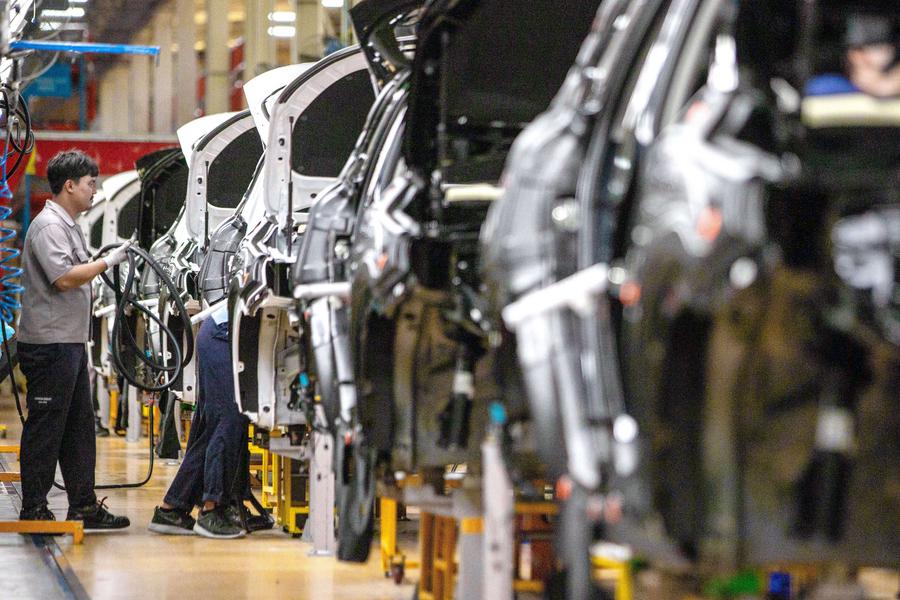
Home
Index
Xinhua Commentary: EU's tariff move needs a reality check on EV industrial chain

BEIJING, Aug. 22 (Xinhua) -- The European Commission's latest draft decision to slap hefty import duties on Chinese electric vehicles (EVs) will definitely hurt European businesses, as the decision ignores a bare truth: the shared weal and woe along industrial chains.
Some politicians are busy stoking fears over the supposed risk of relying too much on China-made products while trumpeting the de-risking narrative, but they have lost sight of the fact that China's EVs are increasingly manufactured globally, which means that erecting a tariff barrier will not benefit local industries in Europe.
China's EV industry has a long industrial chain and involves extensive participation from the United States and Europe. From assembly robots and car chips to tires and stereos, the auto parts and components of a China-made EV demonstrate the close cooperation among global companies across various industries.
As with an iPhone, one can hardly say with complete certainty that it is made or not made in the United States, as every product coming off the production lines has taken a global journey that involves multiple suppliers in multiple countries.
This reality check echoes well the response of the China Association of Automobile Manufacturers (CAAM) on Wednesday, which warned that the commission's move could "severely impact the EU's automotive industry, employment, and efforts toward green and sustainable development."
CAAM urged the European side to uphold dialogue and cooperation to foster a "fair, non-discriminatory and predictable market environment" conducive to the automotive industry's development.
The automotive industries of China and Europe are highly complementary, a fact that has been proved repeatedly by BMW, Volkswagen, Faurecia and other EU companies with their expanding new energy vehicle (NEV) business in China.
Foreign brands, in fact, hold an important position in China's EV exports. One example is Tesla, which ranked a steady first in China's export volume of NEVs in 2023.
In the meantime, Chinese companies such as CATL, NIO and BYD have built factories in European countries including Germany and Hungary, contributing to the competitiveness of the EU electric vehicle industry.
The draft decision to impose definitive countervailing duties, however, has heightened the concerns of Chinese EV manufacturers over the possible risks of investing in Europe.
Industrial analysts have criticized using "overcapacity" as a pretext to pan-politicize economic and trade issues to restrict China's EV industry. Such actions not only fail to address relevant countries' own industrial challenges, but will further drag down the growth of global trade and the recovery of the world economy.
As the commission's investigation advances, it is worth noting that the probe on Chinese EVs that started last October was not initiated by the EU's industries, but was an ex-officio action, meaning it was initiated by the commission grounded on the threat of damage.
The China Chamber of Commerce for Import and Export of Machinery and Electronic Products responded on Wednesday that there was a serious lack of procedural transparency in the commission's probe, which failed to provide objective analysis of the indicators of damage to the EU industry.
Standing in sharp contrast to the repulsion of some EU politicians over China's EV industry is the welcome from the broader market. For instance, Chinese EV manufacturers have tapped into the Southeast Asian markets, including Thailand and Indonesia, forming partnerships with local companies and establishing production facilities.
The New York Times described Thailand's ambitious goal to have EVs account for 30 percent of its automobile production by 2030 as an objective "that seems unattainable without Chinese companies."
So far, at least 12 Chinese car companies have entered the Mexican market, a move expected to facilitate local transition to clean energy and strengthen the latter's competitive position in the global EV industry.
All of these suffice to illustrate what may be overlooked by misconceptions about industrial chains. It is not just about the already globalized EV industry. From chips to semiconductors, industrial chain cooperation is a vivid demonstration of a community with a shared future for humanity in the industrial age.
Some politicians love to play the "China threat" card for political gain, fueling fear of the so-called China-centric industrial chains. The truth is that there has never been a global supply chain that centers around a single country, nor will there ever be in the future.
The dynamism and sustainability of value chains, including crucial aspects like research and development, must rely on multi-centered cooperation across the globe.
That being said, what political headwinds cannot change is the trend that businesses are ever more interdependent, comprising integrated communities with shared interests. Thus, openness, inclusiveness and mutually beneficial cooperation are the only right choice.
Source: Xinhua



